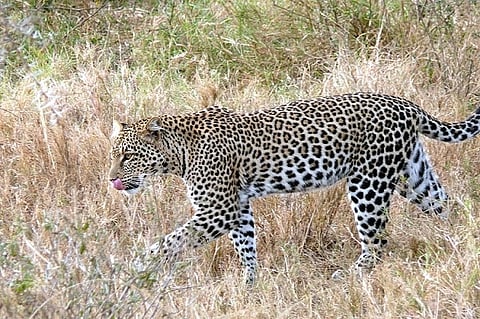

A day after a rescued leopard was released into the wild, the big cat was found dead in Anekal near Bengaluru on Tuesday.
Deccan Herald reported that while forest officials did not confirm if it was the same leopard that was rescued in Kaggalipura on the outskirts of the city, other wildlife conservationists who matched the patches on the animal confirmed that it was the same.
Forest sources reportedly claim that the leopard died of tranquiliser overdose however there is no official confirmation.
The newspaper reported that Bannerghatta Biological Park (BBP) veterinarian Nirupama Rao had tranquilised the animal. She said that it was not an overdose.
“We followed National Tiger Conservation Authority (NTCA) rules which state that if the animal has no injuries and is healthy, it should be released back into the wild,’’ she said. Vidya Athreya, leopard researcher from Wildlife Conservation Society-India, who verified that it was the same animal, said that the big cat could have died because it was released in a new territory.
“Though the animal is the same, it is unlikely that it died due to drug overdose. In India, Ketamine/Xylazine combination drug is used to tranquilise animals as it is the safest. If the animal, after being released was fully up and running, then it is unlikely that the death is because of drug overdose. The effect of these drugs wears away very quickly. But the whole episode of getting caught in the snare, then being captured and released in a new territory could have been very stressful on the animal. This could have caused the death.”
The leopard was found injured and was rescued on Sunday. It was released into Bannerghatta National Park on the same day.
On Monday, it was found in a critical condition near Maralawadi village in Kanakapura. The Times of India report quoted BBP director Santosh Kumar as saying, “Blood and viscera samples of the big cat have been sent to the Institute of Animal Health and Veterinarian Sciences, Hebbal (IAHVS), for further investigation; we are waiting for the report.”
Dr Manjunatha V, Scientist-1, Wild Animal Disease Diagnostic Lab in IAHVS, BBP said that the animal died because of cardiac insufficiency and haemorrhage in the bladder, reported DH.
He added that the five-year-old animal also had snare marks on its hindquarters.